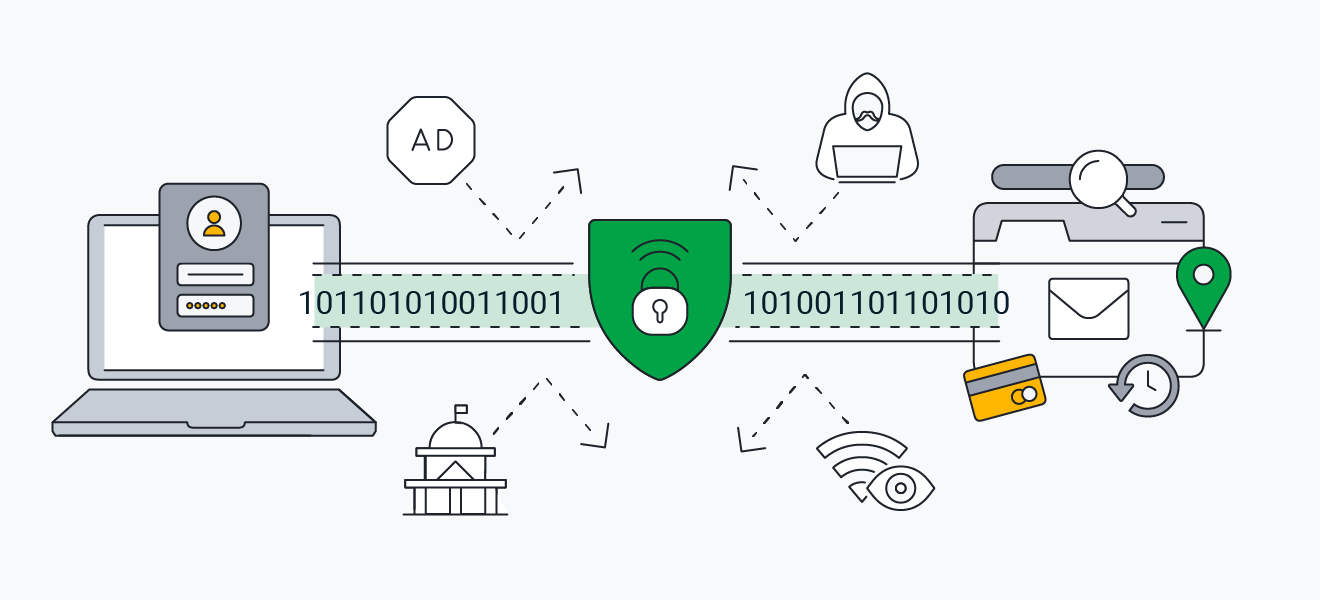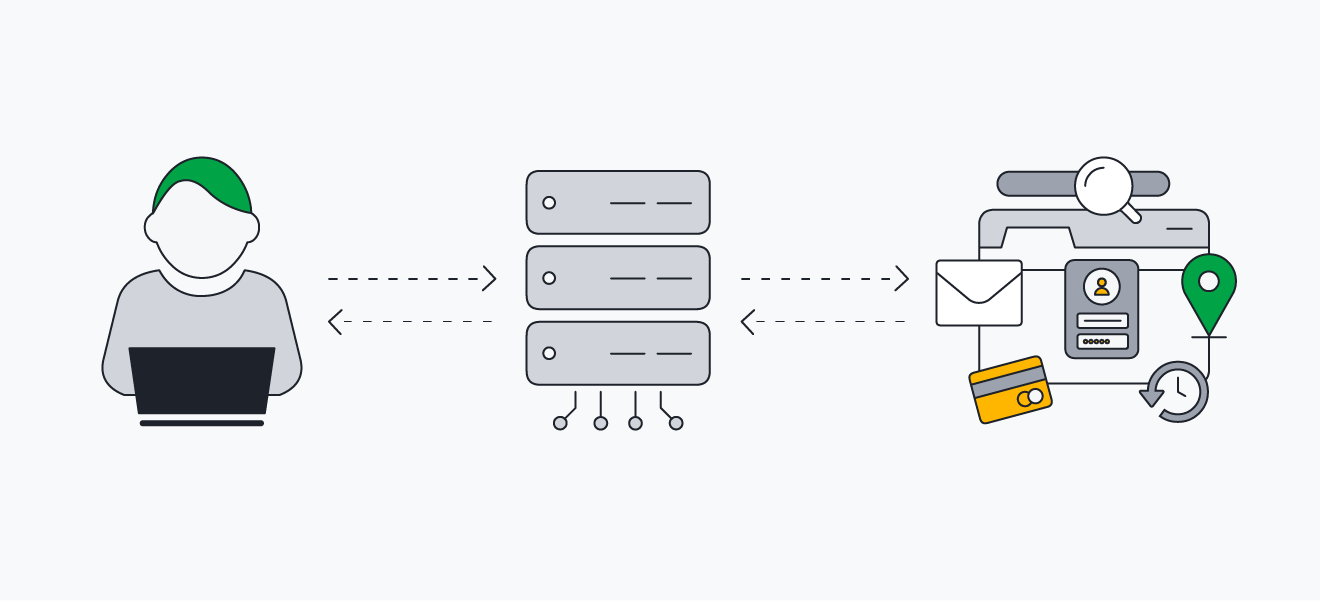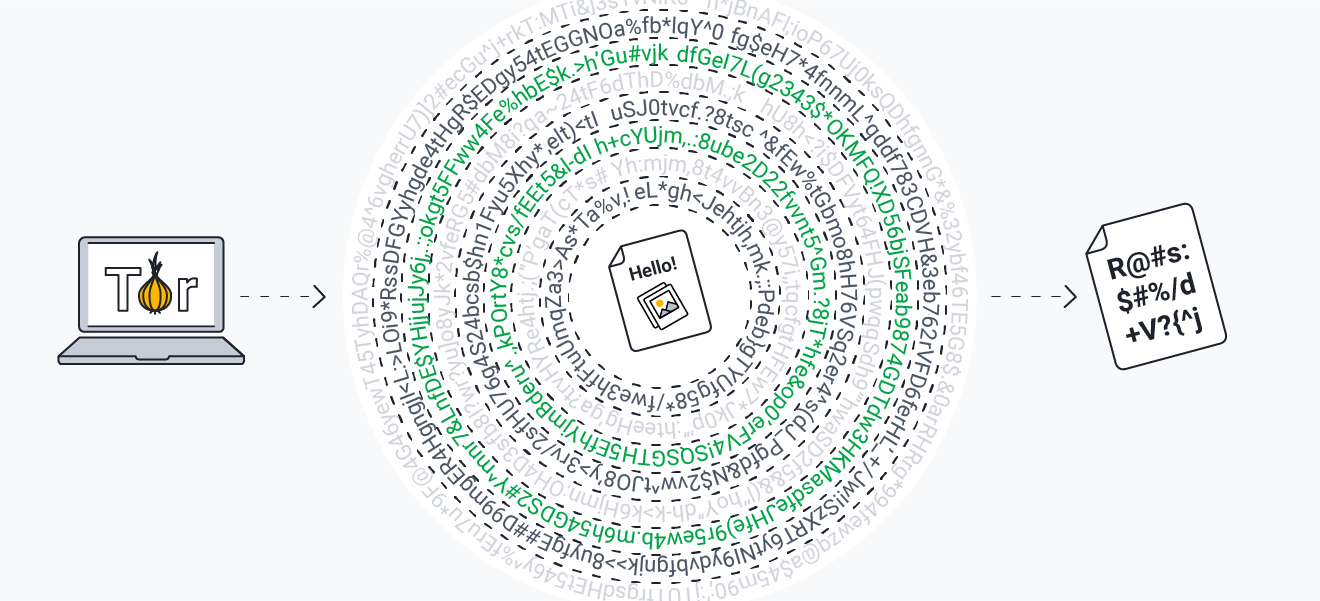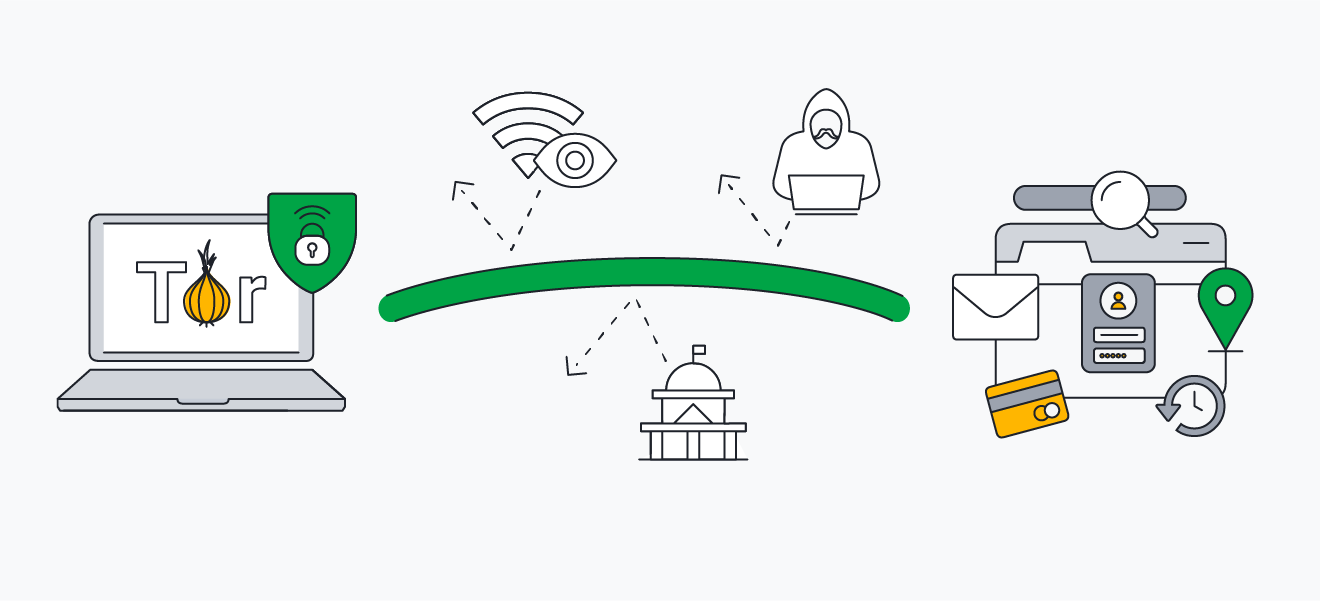What is a proxy?
A proxy is a remote server that acts as an intermediary between you and the internet. When you use a proxy, your browser sends your web requests first to the proxy, which then connects to web servers on your behalf. As far as websites and internet services are concerned, your online identity and the proxy are the same.
A proxy server can help to anonymize you on the internet by concealing your IP address and making you appear as though you’re in a different location — this is helpful when you want to unblock content. But a proxy doesn’t encrypt your web traffic, and some proxies do actually communicate your real IP address to the sites you visit.
What is a VPN?
A VPN encrypts all the internet traffic between your device and the VPN server. Like a proxy, a VPN is a remote server that connects you to the internet. VPN stands for “virtual private network,” and it’s the privacy aspect that differentiates VPN vs proxy.
VPNs cover much of the same ground as proxies do, but with the added bonus of end-to-end encryption on all your traffic (though some proxies do offer HTTPS encryption). A VPN can conceal your IP address from the web services you use, and it allows you to change your real IP address to a different, virtual location. You can set up a VPN on Windows and macOS just as easily as you can add a VPN to your Android or iOS device.
AVG Secure VPN is an ideal solution for protecting your privacy online. Get military-grade encryption and protection against hackers, snoops, ISPs, and anyone else trying to spy on you.
What is Tor?
Tor Browser is a free, open-source software tool that anonymizes your internet traffic under numerous layers of encryption. When you use Tor, your traffic is sent through a series of relay points, called “nodes,” to obscure your data’s point of origin before delivering you to the website you’re trying to visit.
Each Tor node removes one layer of encryption to reveal the next relay point for your traffic. When all the layers have been decrypted, the final relay sends your traffic to your intended website. Tor’s name is derived from the multilayered nature of its encryption method: Tor stands for “The Onion Router.” Of course, the actual process is a bit more complicated than peeling an onion, but it’s a good way to picture how Tor works.
Differences between Tor, VPN, and Proxy
Tor, VPNs, and proxies share many similarities, but what separates these three methods of masking your identity on the internet is that the way they work means they each have specific use cases. Let’s take a closer look:
VPN vs Tor
When it comes to comparing a VPN vs Tor, the layered encryption and traffic-relay system method sets Tor apart. Although incredibly effective at anonymizing and hiding your real location, this comes at the expense of a very slow connection, and it only covers your activity on Tor Browser — data or internet traffic from other applications remains exposed.
Some VPNs offer multi-hop encryption, but they usually route everything through one encryption layer. This doesn’t quite match the extreme anonymity of Tor’s decentralized nodes, but unlike Tor, it does provide true end-to-end encryption for all data and traffic, and it allows you to select your desired server location.
 A VPN creates an encrypted tunnel for your traffic to pass through.
A VPN creates an encrypted tunnel for your traffic to pass through.
Proxy vs VPN
The main difference between a proxy and a VPN (or Tor), is that proxies don’t usually encrypt your internet traffic. That means that if you’re on an unsecured Wi-Fi network, anyone else connected to the same network could eavesdrop on your online activity.
Proxies also only work in the browser that you’re accessing the proxy on, unlike a VPN, which encrypts all the internet traffic between your device and the VPN server. Ultimately, when using a proxy vs VPN, the former provides much weaker privacy safeguards than a VPN, which hides all the device’s online activity.
 A proxy server acts as an intermediary between you and the internet.
A proxy server acts as an intermediary between you and the internet.
Tor vs Proxy
Proxy servers and Tor have a few things in common. For example, they both mask your true location from websites, and both work only in the browser you’re in. However, the way they work is completely different.
Tor is designed to hide your identity at all costs, but the convoluted encryption process it uses means you can’t spoof a specific real-world location, and the connection lag means it’s not suited to gaming or streaming. Proxies may be simpler to use and more expedient, but they don’t encrypt your connection, so the protection you get is more superficial.
 Traffic through the Tor browser passes through many levels of encryption, like the layers of an onion.
Traffic through the Tor browser passes through many levels of encryption, like the layers of an onion.
Proxy vs VPN vs Tor
The proxy vs VPN vs Tor debate comes down to what they’re being used for and what your priorities are. For instance, when it comes to security, a VPN vs proxy is a no-brainer because a VPN anonymizes all your activity while a proxy works only for whatever you’re doing in the browser.
A proxy server helps you connect to a service or website that you usually don’t have access to. It’s most often used to get around institution-specific restrictions, like a school Wi-Fi network that blocks YouTube. Proxies are quick and dirty — not all of them make you anonymous. It’s just about masking your IP address to access a certain website.
A VPN disguises all of your internet activity, sending it through an encrypted tunnel so that nobody can intercept your data or track your activity online. A VPN is often used to make streaming services think you’re in another country to help you access geo-restricted content. It’s also the best solution of the three for boosting your security online.
Tor is a special web browser in which all activity is ultra-hidden, and it’s specifically designed to enable access to the dark web. Tor is a valuable resource that journalists, activists, and whistleblowers use to circumvent government censorship and surveillance, but it can be quite clunky for normal web browsing.
Proxy vs VPN vs Tor — which is best?
You’ve got your three options for online privacy, but between a proxy, a VPN, and Tor, which one is best? Is Tor better than a VPN? Is a VPN faster than a proxy? Is a proxy easier to use than Tor?
We’ve analyzed the differences between proxies, VPNs, and Tor based on seven distinct criteria. Check the table below for a convenient summary, and read on to learn more about how the three stack up against each other.
| |
Proxy
|
VPN
|
Tor
|
|
IP encryption
|
|
✓
|
✓
|
|
Data privacy
|
|
✓
|
✓
|
|
Browsing coverage (web & app)
|
|
✓
|
|
|
Streaming compatibility
|
|
✓
|
|
|
Gaming compatibility
|
|
✓
|
|
|
Number of uses
|
|
✓
|
|
|
Bypasses geo-restrictions
|
✓
|
✓
|
|
|
Mobile compatibility
|
|
✓
|
|
|
Simplicity
|
✓
|
|
|
|
Speed
|
|
✓
|
|
|
Security
|
|
✓
|
✓
|
|
Legality
|
✓
|
|
|
 Speed
Speed
In the age of streaming and HD video content, speed is essential. Because proxies, VPNs, and Tor add extra steps between you and the web, all three may decrease your internet speed.
Proxies are fine for simple tasks, but be wary of disclosing any sensitive personal data while using one — especially free proxies. This includes logging in to check your email or making an online purchase. A free proxy may not be your best choice if speed is your top priority, though you should be able to stream reliably on many paid proxies. But like any intermediary, proxies are also prone to disconnections.
Many VPNs are fast enough so that you can stream fine, but it’s not guaranteed. If possible, select a VPN server that’s located closer to you, as connecting to more distant servers may slow down your speed. Some VPNs automatically connect you to less-trafficked servers to improve your speed, even if those servers aren’t the closest ones to you. If your VPN includes an auto-connect feature like this, use it.
Because Tor sends your traffic through relay nodes before delivering it, it’s usually the slowest of these options. It’s the price you pay for the way Tor hides your origin through its relay network.
 Winner: VPN
Winner: VPN
 Privacy
Privacy
Anonymous proxies hide your IP address, but transparent proxies don’t. And both proxy types reveal themselves as proxies to the destination server. While some anonymous proxies only obscure your IP address, some, like HMA Free Proxy, apply HTTPS encryption to any site you visit. That way, anyone trying to peek at your browser history will see only a bunch of gibberish.
While you’re connected to a VPN, websites and services will see only the IP address assigned to you by the VPN server. But cookies and other trackers on your device are still visible with a VPN. Unless you block them through other means, you’ll allow online marketers to create a unique digital profile of your preferences and behavior in a process known as fingerprinting.
Though some services can detect VPN traffic, they aren’t able to peek inside. There’s only one party who can access your identity when you use a VPN: the VPN provider. That’s why many VPN providers boast about not keeping logs of user activity.
Privacy is Tor’s priority. Tor’s relay encryption is specifically designed to obscure your IP address. Each relay node only knows the IP addresses of the previous and next nodes in the chain. Tor is a very useful tool for journalists, whistleblowers, political dissidents, and anyone else with anonymity as a chief concern. Of course, that also includes cybercriminals and those pursuing other illegal ends.
But be careful using Tor. If you don’t set it up correctly — and many people don’t — you may wind up leaking your IP address or other personally identifiable information. Also, your ISP can identify if you’re using Tor, which may draw unwanted attention. Additionally, Tor is maintained by volunteers, and you can’t verify who is managing each relay node. You may be vulnerable to governments and hacking groups who create nodes to monitor Tor activity. If you use Tor, connect to it via a VPN to hide your IP address — that’s called Tor-over-VPN.
 Winner: Tor (via a VPN)
Winner: Tor (via a VPN)
 Security
Security
When it comes to the integrity of your connection, proxies don’t even begin to compete. The two most common proxy server protocols — HTTP and SOCKS — don’t encrypt your traffic at all. HTTPS proxies provide the same degree of encryption as HTTPS websites. So if you’re going to use a free proxy, be sure it’s HTTPS-capable, and only use it to browse HTTPS websites.
VPNs encrypt your traffic from your device to their server, then pass it onto your destination website or service. If a hacker uses a sniffer to intercept your connection, all they’ll get is your (unreadable) encrypted data. This is one of the main benefits of using a VPN: it will protect you on unsecured public Wi-Fi networks.
While Tor routes your traffic around relay nodes, your data stays encrypted and safe from prying eyes. And because the relay route changes every time you use Tor, it’s impossible to predict where your traffic will go. There’s just one vulnerability in Tor’s security: the exit node. If your desired website isn’t using HTTPS security, it’d be possible for somebody to intercept your traffic as it exits the Tor network — and even HTTPS isn’t foolproof.
 Winner: VPN
Winner: VPN
 Mobile compatibility
Mobile compatibility
As mentioned above, proxies apply on a per-application basis. On mobile, you might find that certain apps ignore your proxy altogether. There’s no way to force an app to use the proxy if its developer doesn’t want it to.
Most mainstream VPNs are available for all standard operating systems: Windows and macOS as well as Android and iOS. The VPN application should only require minor manual adjustments to the settings on your device, if any. Otherwise, as soon as you set up your VPN on Windows, or turn on your mobile VPN, your internet connection is protected.
The sole official mobile solution for Tor is an Android-only app — there’s no way for iOS users to access Tor on their phones and tablets without turning to intermediary apps. If you’re using Tor Browser, anything you do on other apps won’t be secure, unless you also configure them to access the Tor network.
 Winner: VPN
Winner: VPN
 Simplicity
Simplicity
If you’re just looking to do a quick bit of web surfing, proxies are an easy option. But never use a web-based proxy to conduct any online activity that may divulge sensitive personal information, such as your login credentials or banking information.
A VPN isn’t much more complicated than a proxy, but you’ll have to download a VPN and set up your account. Once you’ve installed the VPN, you should be able to activate it with a single click or tap.
Installing and using Tor Browser is about as easy as with any other browser. Download it, install it, run through the configuration process, then enter the URL you’d like to visit. Your anonymity may falter if you change some of Tor’s default settings, such as whether or not it logs your browser history.
 Winner: Proxy
Winner: Proxy
 Streaming
Streaming
Proxies and VPNs can both support content streaming. If you want to access content from your home country while abroad, all three options may work, though at varying degrees of stability.
A VPN typically provides the fastest and most consistent internet speed, making it your best choice for streaming. However, some content providers attempt to block VPN connections.
 Winner: VPN
Winner: VPN
 Legality
Legality
Many countries have banned, restricted, or censured the use of VPNs and Tor, and you may encounter trouble should you go ahead and use these services there. In other countries, internet privacy tools may not be explicitly illegal. But due to internet censorship laws, you might cross a line when you view or post certain types of content.
Even when Tor is permitted, its use may draw suspicion due to its associations with political illegal activity and the dark web.
A few countries have banned proxies as well, but they are generally the least restricted of the three options. Always investigate the laws of the country you’re in before using any of these internet security tools.
 Winner: Proxy
Winner: Proxy
Which should you choose? Proxy vs VPN vs Tor
As you can see, there’s no one single choice among a proxy, VPN, or Tor. Instead, think about why you’re using these tools and how you’ll put them to use. Each option has its optimal uses, and, alternatively, each tool may be inconvenient for certain tasks.
When to use a proxy
-
You want to get around content restrictions occasionally.
-
You don’t need to do anything online that involves the disclosure of sensitive personal information.
-
You want basic IP protection with an anonymous proxy but don’t need to encrypt your data.
When to use a VPN
-
You want to encrypt all the traffic coming to and from your device.
-
You want to hide your IP address and location.
-
You want to get around content blocks regularly.
-
You want to browse securely on public Wi-Fi.
When to use Tor
-
You want total browsing anonymity to prevent tracking (and plan to access only HTTPS websites).
-
You’re a journalist, whistleblower, political dissident, or another type of activist and want to share or publish sensitive material.
-
You have the expertise needed to configure your device to use the Tor network safely.
Can you use VPNs, proxies, or Tor together?
You can combine a VPN with both Tor and web-based proxies. If you connect to a VPN and then direct your traffic to a web-based proxy, you’ll be able to use both services simultaneously, but the proxy won’t offer any additional advantages over your VPN, so there’s not much point combining a proxy with a VPN.
When you pair a VPN with Tor, you have two options: using Tor to access your VPN or using your VPN to reach Tor. The former allows you to access websites that typically block traffic from Tor nodes, while the latter hides your Tor use from your ISP.
-
Tor over VPN: You connect to your VPN, then access the internet through Tor. This method is most often used by people who are blocked from accessing the Tor network.
-
VPN over Tor: You connect to a VPN after your traffic leaves the Tor exit node. This prevents the websites you’re using from identifying you as a Tor user.
 Tor-over-VPN offers strong security when anonymity and privacy are paramount..
Tor-over-VPN offers strong security when anonymity and privacy are paramount..
Protect your online identity the easy way
A VPN’s combination of privacy, security, and simplicity is hard to beat. AVG Secure VPN creates your own private tunnel through the internet, providing ironclad encryption for all your online traffic. Install AVG Secure VPN today to secure your Wi-Fi, block spies and snoops, and strengthen your online privacy.
FAQs
Should I use both a VPN and a proxy?
There’s no point using both a VPN and a proxy — it’ll only slow your connection down. A proxy masks your IP address for the sake of the one-time connection you’re trying to make. But a VPN both masks your IP address and encrypts all your internet traffic, so the main benefit of a proxy is already covered by your VPN.
Is a VPN the same as a proxy?
The only real similarity between VPNs and proxies is that they both send your web traffic through an intermediary server. That means that they can both be used to hide or change your online location. But while a proxy doesn’t encrypt your connection, using a VPN boosts security and privacy by obscuring your IP address and protecting your data from snoops, spies, and hackers.
Is Tor a VPN?
Tor is not a VPN. Tor is a browser built on a decentralized network of relay nodes that encrypt and mask your traffic on its way to its destination. A VPN, meanwhile, is a centralized privacy tool that sends your internet traffic through a different server controlled and operated by the VPN service.

 A VPN creates an encrypted tunnel for your traffic to pass through.
A VPN creates an encrypted tunnel for your traffic to pass through. A proxy server acts as an intermediary between you and the internet.
A proxy server acts as an intermediary between you and the internet. Traffic through the Tor browser passes through many levels of encryption, like the layers of an onion.
Traffic through the Tor browser passes through many levels of encryption, like the layers of an onion. Tor-over-VPN offers strong security when anonymity and privacy are paramount..
Tor-over-VPN offers strong security when anonymity and privacy are paramount..




